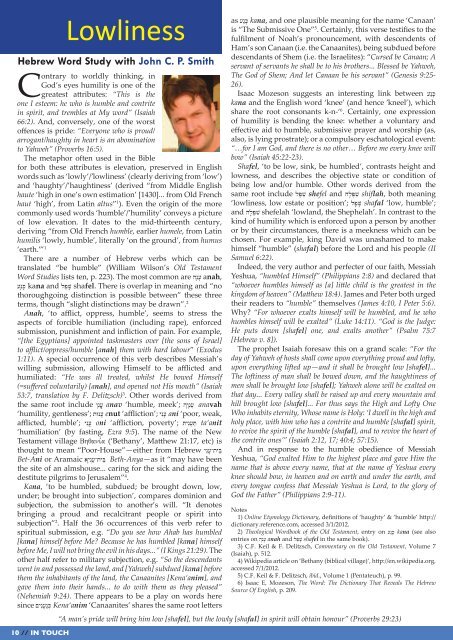In Touch Quarter 1 - 2012
You also want an ePaper? Increase the reach of your titles
YUMPU automatically turns print PDFs into web optimized ePapers that Google loves.
10 // IN TOUCH<br />
Lowliness<br />
Hebrew Word Study with John C. P. Smith<br />
Contrary to worldly thinking, in<br />
God’s eyes humility is one of the<br />
greatest attributes: “This is the<br />
one I esteem: he who is humble and contrite<br />
in spirit, and trembles at My word” (Isaiah<br />
66:2). And, conversely, one of the worst<br />
offences is pride: “Everyone who is proud/<br />
arrogant/haughty in heart is an abomination<br />
to Yahweh” (Proverbs 16:5).<br />
The metaphor often used in the Bible<br />
for both these attributes is elevation, preserved in English<br />
words such as ‘lowly’/’lowliness’ (clearly deriving from ‘low’)<br />
and ‘haughty’/’haughtiness’ (derived “from Middle English<br />
haute ‘high in one’s own estimation’ [1430]... from Old French<br />
haut ‘high’, from Latin altus” 1 ). Even the origin of the more<br />
commonly used words ‘humble’/’humility’ conveys a picture<br />
of low elevation. It dates to the mid-thirteenth century,<br />
deriving “from Old French humble, earlier humele, from Latin<br />
humilis ‘lowly, humble’, literally ‘on the ground’, from humus<br />
‘earth.’” 1<br />
There are a number of Hebrew verbs which can be<br />
translated “be humble” (William Wilson’s Old Testament<br />
Word Studies lists ten, p. 223). The most common are hn'[' anah,<br />
[n'K' kana and lpev' shafel. There is overlap in meaning and “no<br />
thoroughgoing distinction is possible between” these three<br />
terms, though “slight distinctions may be drawn”. 2<br />
Anah, ‘to afflict, oppress, humble’, seems to stress the<br />
aspects of forcible humiliation (including rape), enforced<br />
submission, punishment and infliction of pain. For example,<br />
“[the Egyptians] appointed taskmasters over [the sons of Israel]<br />
to afflict/oppress/humble [anah] them with hard labour” (Exodus<br />
1:11). A special occurrence of this verb describes Messiah’s<br />
willing submission, allowing Himself to be afflicted and<br />
humiliated: “He was ill treated, whilst He bowed Himself<br />
(=suffered voluntarily) [anah], and opened not His mouth” (Isaiah<br />
53:7, translation by F. Delitzsch) 3 . Other words derived from<br />
the same root include wn'[''' anav ‘humble, meek’; hw'n'[] anavah<br />
‘humility, gentleness’; tWn[/ enut ‘affliction’; ynI[' ani ‘poor, weak,<br />
afflicted, humble’; ynI[\ oni ‘affliction, poverty’; tynI[]T; ta‘anit<br />
‘humiliation’ (by fasting, Ezra 9:5). The name of the New<br />
Testament village Bhqani,a (‘Bethany’, Matthew 21:17, etc) is<br />
thought to mean “Poor-House”—either from Hebrew ynI['-tyBe<br />
Bet-Ani or Aramaic ay'n>[;-tyBe Beth-Anya—as it “may have been<br />
the site of an almshouse... caring for the sick and aiding the<br />
destitute pilgrims to Jerusalem” 4 .<br />
Kana, ‘to be humbled, subdued; be brought down, low,<br />
under; be brought into subjection’, compares dominion and<br />
subjection, the submission to another’s will. “It denotes<br />
bringing a proud and recalcitrant people or spirit into<br />
subjection” 2 . Half the 36 occurrences of this verb refer to<br />
spiritual submission, e.g. “Do you see how Ahab has humbled<br />
[kana] himself before Me? Because he has humbled [kana] himself<br />
before Me, I will not bring the evil in his days...” (I Kings 21:29). The<br />
other half refer to military subjection, e.g. “So the descendants<br />
went in and possessed the land, and [Yahweh] subdued [kana] before<br />
them the inhabitants of the land, the Canaanites [Kena‘anim], and<br />
gave them into their hands... to do with them as they pleased”<br />
(Nehemiah 9:24). There appears to be a play on words here<br />
since ~ynI[]n:K. Kena‘anim ‘Canaanites’ shares the same root letters<br />
as [n:K' kana, and one plausible meaning for the name ‘Canaan’<br />
is “The Submissive One” 5 . Certainly, this verse testifies to the<br />
fulfilment of Noah’s pronouncement, with descendents of<br />
Ham’s son Canaan (i.e. the Canaanites), being subdued before<br />
descendants of Shem (i.e. the Israelites): “Cursed be Canaan; A<br />
servant of servants he shall be to his brothers... Blessed be Yahweh,<br />
The God of Shem; And let Canaan be his servant” (Genesis 9:25-<br />
26).<br />
Isaac Mozeson suggests an interesting link between [n:K'<br />
kana and the English word ‘knee’ (and hence ’kneel’), which<br />
share the root consonants k-n-‘ 6 . Certainly, one expression<br />
of humility is bending the knee: whether a voluntary and<br />
effective aid to humble, submissive prayer and worship (as,<br />
also, is lying prostrate); or a compulsory eschatological event:<br />
“…for I am God, and there is no other… Before me every knee will<br />
bow” (Isaiah 45:22-23).<br />
Shafel, ‘to be low, sink, be humbled’, contrasts height and<br />
lowness, and describes the objective state or condition of<br />
being low and/or humble. Other words derived from the<br />
same root include lp,ve shefel and hl'p.vi shiflah, both meaning<br />
‘lowliness, low estate or position’; lp'v' shafal ‘low, humble’;<br />
and hl'pev shefelah ‘lowland, the Shephelah’. <strong>In</strong> contrast to the<br />
kind of humility which is enforced upon a person by another<br />
or by their circumstances, there is a meekness which can be<br />
chosen. For example, king David was unashamed to make<br />
himself “humble” (shafal) before the Lord and his people (II<br />
Samuel 6:22).<br />
<strong>In</strong>deed, the very author and perfecter of our faith, Messiah<br />
Yeshua, “humbled Himself” (Philippians 2:8) and declared that<br />
“whoever humbles himself as [a] little child is the greatest in the<br />
kingdom of heaven” (Matthew 18:4). James and Peter both urged<br />
their readers to “humble” themselves (James 4:10, I Peter 5:6).<br />
Why? “For whoever exalts himself will be humbled, and he who<br />
humbles himself will be exalted” (Luke 14:11). “God is the Judge:<br />
He puts down [shafel] one, and exalts another” (Psalm 75:7<br />
[Hebrew v. 8]).<br />
The prophet Isaiah foresaw this on a grand scale: “For the<br />
day of Yahweh of hosts shall come upon everything proud and lofty,<br />
upon everything lifted up—and it shall be brought low [shafel]...<br />
The loftiness of man shall be bowed down, and the haughtiness of<br />
men shall be brought low [shafel]; Yahweh alone will be exalted on<br />
that day... Every valley shall be raised up and every mountain and<br />
hill brought low [shafel]... For thus says the High and Lofty One<br />
Who inhabits eternity, Whose name is Holy: ‘I dwell in the high and<br />
holy place, with him who has a contrite and humble [shafal] spirit,<br />
to revive the spirit of the humble [shafal], and to revive the heart of<br />
the contrite ones’” (Isaiah 2:12, 17; 40:4; 57:15).<br />
And in response to the humble obedience of Messiah<br />
Yeshua, “God exalted Him to the highest place and gave Him the<br />
name that is above every name, that at the name of Yeshua every<br />
knee should bow, in heaven and on earth and under the earth, and<br />
every tongue confess that Messiah Yeshua is Lord, to the glory of<br />
God the Father” (Philippians 2:9-11).<br />
Notes<br />
1) Online Etymology Dictionary, definitions of ‘haughty’ & ‘humble’ http://<br />
dictionary.reference.com, accessed 3/1/<strong>2012</strong>.<br />
2) Theological Wordbook of the Old Testament, entry on [n:K' kana (see also<br />
entries on hn'[' anah and lpev' shafel in the same book).<br />
3) C.F. Keil & F. Delitzsch, Commentary on the Old Testament, Volume 7<br />
(Isaiah), p. 512.<br />
4) Wikipedia article on ‘Bethany (biblical village)’, http://en.wikipedia.org,<br />
accessed 7/1/<strong>2012</strong>.<br />
5) C.F. Keil & F. Delitzsch, ibid., Volume 1 (Pentateuch), p. 99.<br />
6) Isaac E, Mozeson, The Word: The Dictionary That Reveals The Hebrew<br />
Source Of English, p. 209.<br />
“A man’s pride will bring him low [shafel], but the lowly [shafal] in spirit will obtain honour” (Proverbs 29:23)

















